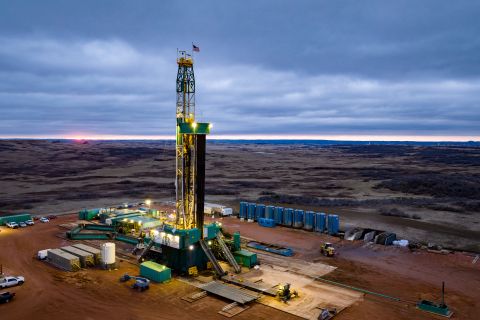Lebanon and Israel have reached a historic agreement demarcarting a disputed maritime border between them following years of U.S.-mediated negotiations, Israeli Prime Minister Yair Lapid said on Oct. 11.
While limited in scope, a deal would mark a significant compromise between states with a history of war and hostility, opening the way for offshore energy exploration and easing a source of recent tensions.
"This is a historic achievement that will strengthen Israel's security, inject billions into Israel's economy and ensure the stability of our northern border,” Lapid said in a statement.
In Lebanon, President Michel Aoun said the terms of the final U.S. proposal were satisfactory and he hoped the deal would be announced as soon as possible.
The agreement is meant to resolve a territorial dispute in the eastern Mediterranean sea in an area where Lebanon aims to explore for natural gas. Israel is already producing natural gas at fields nearby.
It sets a border between Lebanese and Israeli waters for the first time and also establishes a mechanism for both countries to get royalties from an offshore gas field that straddles the boundary.
The deal does not touch on their shared land border.
Lebanese negotiator Elias Bou Saab told Reuters that the latest draft "takes into consideration all of Lebanon's requirements, and we believe that the other side should feel the same."
It was also endorsed by the heavily armed, Iran-backed Lebanese group Hezbollah, which until recently has threatened to attack Israeli gas facilities, according to two officials.
A senior Lebanese government official and an official close to Hezbollah said the group had agreed to the terms of the deal and considered negotiations "over." Hezbollah has yet to formally comment.
While Israel has moved ahead with production and export of natural gas, Lebanon's efforts have been hamstrung by political dysfunction.
A gas find would be a major boon for Lebanon, which has been mired in financial crisis since 2019, and could fix Lebanon's long-standing failure to produce adequate electricity for its population.
Lapid, who faces a Nov. 1 election, plans to seek approval on Oct. 12 for the deal from his security cabinet and then the government before it is reviewed by parliament. An Israeli official said final approval was expected within the next three weeks.
The Institute for National Security Studies, a Tel Aviv University think tank, called the deal a "win-win situation."
"An agreement between Israel and Lebanon will mark a fundamental positive change in relations between the two countries...and it may open the door to further changes in the future relationship between them," it said in a report.
Recommended Reading
Nabors Takes to Global Expansion in 3Q as Rig Count Shrinks in Lower 48
2024-10-25 - Nabors Industries saw broad growth across key international geographies in third-quarter 2024, with more rig deployments expected.
Smart Tech Moves to the Hazardous Frontlines of Drilling
2024-10-08 - In the quest for efficiency and safety, companies such as Caterpillar are harnessing smart technology on drilling rigs to create a suite of technology that can interface old and new equipment.
As Rig Count Slips, Oil Production Keeps Growing
2024-10-22 - Despite the offshore rig market showing signs of demand slippage, oil production looks to be on the rise for the foreseeable future, Westwood analysts say.
E&P Highlights: Sept. 23, 2024
2024-09-23 - Here's a roundup of the latest E&P headlines, including Turkey receiving its first floating LNG platform and a partnership between SLB and Aramco.
Chevron Pushing Longer Laterals in Argentina’s Vaca Muerta Shale
2024-09-13 - Chevron Corp., already drilling nearly 2.8-mile laterals at its Loma Campana Field in Argentina, wants to drill even longer horizontals, an executive told Hart Energy.
Comments
Add new comment
This conversation is moderated according to Hart Energy community rules. Please read the rules before joining the discussion. If you’re experiencing any technical problems, please contact our customer care team.





